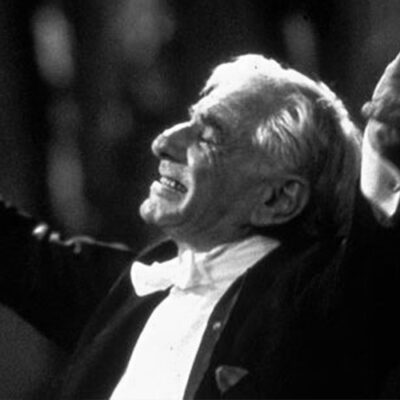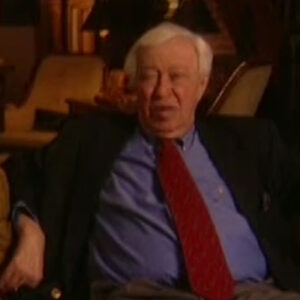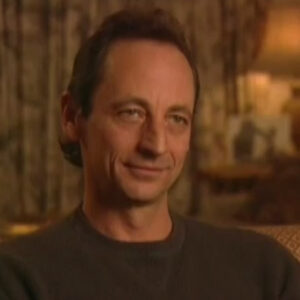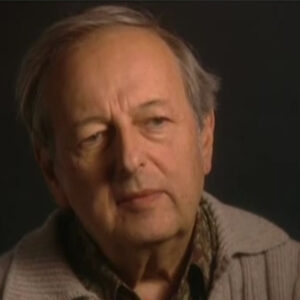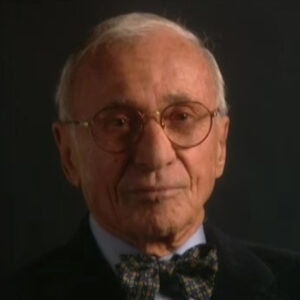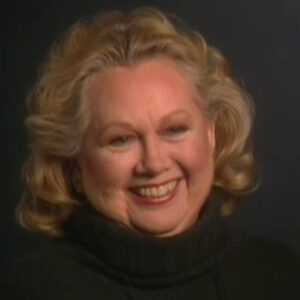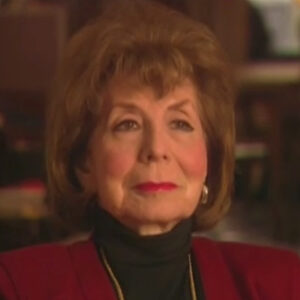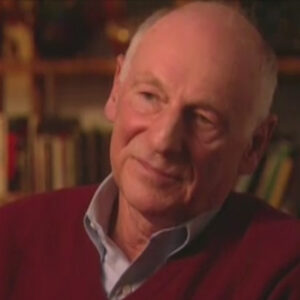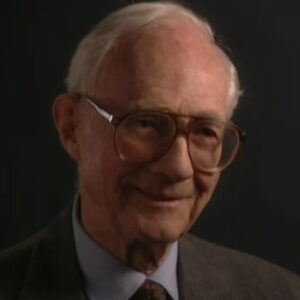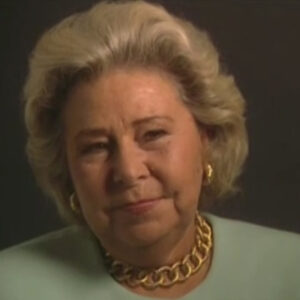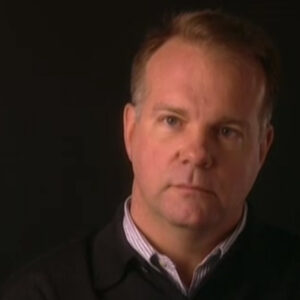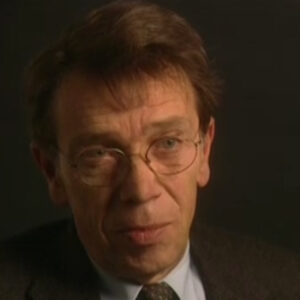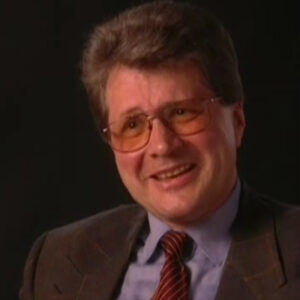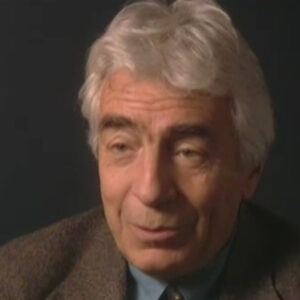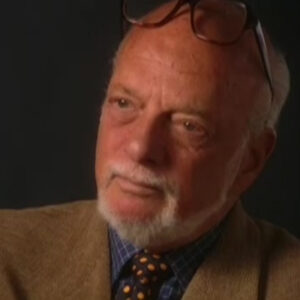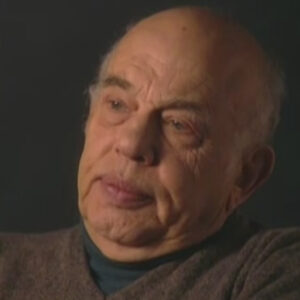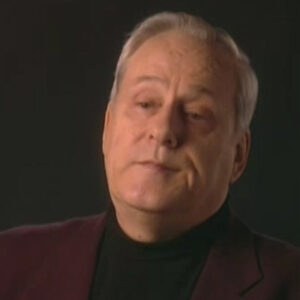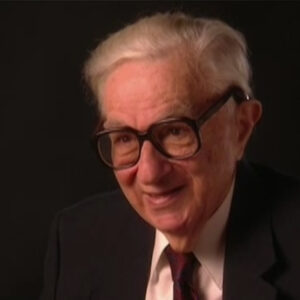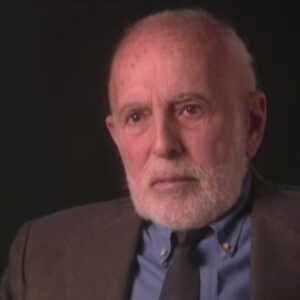Speaker Yeah, it took a long it was a long time coming. Meeting with him for the first time and it actually dated back to when I was a teenager, I saw him a lot as a conductor. And one of the highlights of of that period was when he conducted Mahler two at the Edinburgh Festival. Just before that happened, Mass came out. Mass completely blew me away. I, I, I only know now why it blew me away. But at the time it was just a gut feeling. It just it was just a piece that I related to straight away. And I actually wrote him a fan letter. And it’s the first time, the only time I’ve ever done that in my life. I actually wrote him a letter, sent it to the Edinburgh Festival, care of the Usher Hall, expected to hear no more about it. I didn’t even put my phone number or address on it. I just sort of wrote in this letter. And no, I that’s that’s wrong. I put my address on it, but no phone number. And the next thing I get a call or a call comes through from Harry Crout to my home saying that Mr Burnside will be very moved by this letter I talked about. I was a young actor, something you didn’t know in the past. And this this took me by storm because it was such a theatre piece. And the idea of actually being involved in a piece like that was was exciting to me. So I wrote what I put all these thoughts down. I wrote in this letter and Harry Crout came through Mr Burnside. I was very moved. He would like to meet you during the recording sessions at Ealing Cathedral for the Mahler two recording with the NSO. Well, I went to those sessions and I never did get to meet Mr Bernstine. Everything was turned upside down. The schedule overran and what, twenty years later? I’ve started my journalistic career and as a long serving Bernstine fan, both as a conductor and as a composer, I was waiting really for the opportunity finally to meet him. It passed me by once or twice. Gramophone magazine tended to use Edward Greenfield, who had known Lenny for many years, and eventually around the time he was recording candid and performing Candide in London. The magazine said, Okay, look, this is your chance. We’re going to set you up with this. I still didn’t know that it was going to happen. I still didn’t know how I was going to tackle the interview. But everybody I’d ever met, all the conductors I’d ever met, who ever knew. Lenny said if you meet him, talk about his music, this is the way to his heart. So I. I took all this on board and board in mind. And on the day of the interview, I was called the day before and and said, you’re on lunchtime tomorrow. Break in rehearsals of candy, you’re on. So I arrive at the Barbican Hall and Craig Okot comes up and susses me out and says, I will remind Lenny of his responsibilities at the break.
Speaker And I said, will we be alone? I have never been as nervous about doing an interview in my life. I think it’s the fear of one of your heroes being found to have feet of clay. Perhaps I didn’t sleep. I thought, how will I start this thing? Will we be interrupted? Will we be alone? All these things were going through my mind. This was an important interview for me just before the break. Jerry hardly saying nothing more than this, which is one of the numbers from Candy that was cut from the show when it was on Broadway. I had never heard it before. I had heard of it. And I sat there and was so moved by this this little aria. That I thought, well, this is a way in, so I’m taken backstage and Lenny, who is very sick, everybody had flu, everybody was dropping out of those performances, was brought to to meet me. And he he he came up to me. He shook my hand and he said, I’ve been told I had to do this interview on Pain of Death.
Speaker And I I said, I hope it’s not going to be that bad. Really, I do.
Speaker And he said, OK, so he shambled along. I thought, well, what is this going to be like? So we go into the room and I said, you know, I love that, that no, I’ve never heard it before. And he said, oh, that that’s my Puccini aria. And we we started this conversation about Candy. And then I, I, I made the statement. I said today we’re going to talk about Leonard Bernstein, the composer, not Leonard Bernstein, the conductor, the composer. And I swear to God, a transformation came over him at that moment. He was so taken aback and so surprised and became almost childlike and said became quite restless and quite nervous, said, oh, oh, good, good.
Speaker And and then offered me sandwiches.
Speaker And we sat and we did we talked about his music. And I remember during the course of it, we talked a lot about Mass and I wanted to talk to him about the moment in the Sanctus where he writes a song about the writing of a song which seemed to me to be so representative of everything he stood for, the idea that there’s this celebrant there with his guitar and he’s redundantly plugging away at it and he finds a note, he finds any Amee Doree, me, and it’s just one note and he says, well, me is only me. Me alone is only me. The words go in the text and then he finds a g a soul. And suddenly there are two notes and that is the beginning of a melody. And then a song is beginning, is beginning to grow, take wing and rise up. Singing The words go and and it’s it’s it’s about creating in the moment of singing or playing. It seems to be so representative of this huge gift that Bernstein had. We talked about that and I said to him, you know, and he actually started to sing it at that moment. And I said, I think mass is probably the most important piece. I think this is your seminal piece. And he said seminal. I said, my God. He said there’s a critic’s word he said, but I might just kiss you on the lips for saying it. And that was it. That was the start of this extraordinary meeting. And Craig duly came in every quarter of an hour to check. But Lennon was not being poured into oblivion by this journalist. And he kept saying, Craig, what’s your problem? We’re quite happy here. And I had this amazing hour with him and I hoped it was going to be the beginning of something ongoing because a relationship had been set up. Apparently, he went and told Humphrey Burton shortly afterwards that he’d met this young man who knew what he was trying to do. Extraordinary statement from this legend. He was this small journalist who had finally got to meet him, and he was impressed that I wanted to talk about his music. That gives you some indication, I think, at how deeply insecure he was that nobody cared about it.
Speaker That was great. Before we go into some of the other things we were talking about upstairs, tell me about the time you had. What did he say about me? I wouldn’t say that.
Speaker He said that mass really was a kind of reaction to that, the end of that period of of of hope and newfound innocence that the 60s brought us, I mean, it was this extraordinary period of, hey, there may be some new beginnings here. People started to question people started to say, why are we getting involved in this war? Why are we blindly following these religions? Why are we doing this, this and this? It was a kind of reaction to that. It was also, of course, a reaction to. The way politics were going as he saw them in the in the states and in fact, he said that during rehearsals for Mass, that he had heard that there were White House spies sent out to check out whether this was actually a subversive piece in any way. Nothing could be further than the truth. This was just simply Lenny’s rallying call to humankind. It was like saying that music. Can transcend all those religious, cultural, political barriers that we put up. It is a universal language in a sense. The song in the Sanctus is the universal song in the way that Charles Ives wrote would write a universal song to something very American. I mean, this whole this this whole thing of of of rallying song. And so mass was just simply a way. It was also a way of bringing together all those strands that made Lenny’s music what it was, a composer. A Composers’ style is is founded on his experience and many experienced he needed to experience everything, all the elements from whether it be rock, gospel, serial techniques, musical theater, all the influences were there.
Speaker And it wasn’t so much about it being eclectic or him being an eclectic composer. In a sense, he was an evolutionary composer. One of the things he said to me during that interview was, you know, everything comes from somewhere else. He said, let’s not get hung up on being original. Everything comes from somewhere else. You look at the Rite of Spring, he said. Some of it’s embarrassing. He said the the the French influences, the Rimsky Korsakov influences. He said it’s there is no such thing as it can sound like an all new experience, but it has derived from somewhere else. And that was the kind of creed of his and he actually put it into some of his compositions. If you take the serenade for violin and strings and percussion, the idea that thematically it’s kind of evolves as a series of chain reactions, really one thing grows out of something else. And the idea that that beautiful slow movement Akesson should emerge from an almost meaningless phrase that’s happened some way back is extraordinary.
Speaker He loved that magic about composition. Third Symphony, caddish atonal beginnings.
Speaker Third Movement has this little Copeland tune which emerges like a kind of a butterfly from the chrysalis, the Wolfhound Chrysalis, if you like. So there was this constant feeling of evolution in his music. So we talked a lot about about that. We talked about the nature of melody as well.
Speaker Melodies suborn There’s no accounting for what makes a great melodist, Lenny was a great melodist. He could almost compose a melody to order the passage in the Sanctus about the writing of a song. If you have words, a song is beginning, is beginning to grow and rise up. Singing The only way you can set those words is something inspirational is a melody that in fact does grow and soar and inspire you.
Speaker How do you do that when you know you have to produce something like that? It’s like Wagner producing the prize song in Meistersinger. The whole opera collapses if the prize song is not the most sublime thing you’ve ever heard. And he did that and he was able to do that. And when I asked him how he did it, of course, he couldn’t answer. He said, well, I kind of sit at the piano and he said, God either sends me a tune or he doesn’t.
Speaker And how else can you describe it? And yet those melodies were always distinctly his, sometimes very, very sweet, sometimes very elusive. You can never time down. So there was all that to talk about, there was all the the genesis of Candied, which was a complicated genesis, which was really just Lenny’s way of paying tribute to his roots in musical theater or American roots in musical theater, which was European operetta.
Speaker And it’s like the most outrageous celebration of everything, that European operetta is good and bad. It’s way beyond pastiche. It’s far too good for that. That’s the mark of a great composer, I think. But he kind of he kind of lost a grip on Candide in a way. It kind of too many cooks spoiling the broth, if you like. But he sure as hell knew that because his his his his whole being was rooted in theater. He was always on stage in in every sense.
Speaker He he loved to write for the theater.
Speaker And I think he dreamed that out of the work he had started to establish with works like West Side Story and on the Town, which were radical pieces in West Side Story, a musical ending with a first act curtain where there are three dead bodies on stage on the town with eight purely dance episodes where the whole of the Bernstine orchestral sound kind of came from, that that that feeling, that that streetwise music that that he knew and loved so well. And I think he always hoped that out of them, other people would come along to kind of create what he termed as a peculiarly American kind of opera.
Speaker He something that was peculiarly American, I put it to him, I said, you know, but American musical comedy is opera. It is the American opera. It is something that the Americans invented, really. It may have come from the European operetta, but they took it somewhere else. I mean, Rodgers and Hammerstein with Oklahoma took it somewhere else at that time and since then, Stephen Sondheim, of course. And yet he still wasn’t happy with that idea. He still somehow wanted to elevate it even further, which surprised me in a way.
Speaker Do you think he meant by that? I mean, what do you think he meant? That everything was kind of hard to elevate?
Speaker Well, that’s what that’s what it puzzled me that he wanted to try to elevate it in that way. It’s like people calling, calling present-day musicals, rock operas.
Speaker It’s like by adding the word opera, you somehow legitimize you somehow make it more serious. It is what it is. I think that was all part of this deep insecurity. I think it was a little part of this feeling that that by writing musical comedy, he sometimes somehow wasn’t doing something deeply serious. He must have known he was. It’s funny, when we met for our interview, he he talked about Sondheim. He said, oh, my, Stevie, you know, I kind of invented him. He said, you know, in that that way that was, I’m sure would really get Sondheim’s back up. But that was that was Lenny being throwing in one of his little glib remarks. And he said he’s he’s writing on a piece, working on a piece of the moment, which is called Assassins’. And he says it’s about the murders of presidents and it’s about guns. Now, this is way before assassins came out and he said, thank God. He said Steeves finally working on something that is worthwhile and and and significant and important. Now, that was a sort of give away as well. Things needed to have. Yes. A political or social relevance. But I think there was a deep insecurity there that Americans weren’t doing things that were important enough. And let’s face it, that had been drummed into him for years and years and years. He was, you know, when he made the transition from being a composer of popular music into becoming an international a serious international conductor. He had a terribly hard time. People did not take him seriously. This man came from Tin Pan Alley. What did he know about conducting the great Viennese classics? And it was all a nonsense, of course. I mean, he was from the start an inspirational, a great conductor, but people didn’t take him seriously because of his background in thank heavens. Now we live in an age where those barriers, those divisions are being knocked down, where music is music is music, which is everything Bernstein stood for. And that’s one of the things I love most about him and identified so closely with.
Speaker I don’t know that there’s really a whole lot to do about that. But you’re probably aware in reading Humphrey’s book and knowing other things about Lenny that that beginning with the assassination of John Kennedy and a series of assassinations that as his children said, the light went out in their house for a long time because, you know, there was some before and after. In terms of his sense of optimism about the possibilities that he continued to write about. Do you think that that ties in in some way to his feeling that what Sondheim was doing with guns was pretty good?
Speaker I think I think Lenny had an an acute social conscience. I think it deeply disturbed him man’s inhumanity to man. I think it disturbed him that he was living in a country where the proliferation of firearms was causing such grave problems. And the idea that that Sondheim should make a link between this object, the gun should also write a beautiful wolf’s like barbershop quintet about the beauties of this piece of machinery, this killing machinery, and how many people’s lives that the making of that machine involves was something that Bernstine would have related to big time.
Speaker It was easy to it was easy to dismiss some of his social conscience as radical chic, you know, Lenny sort of baring his soul and saying what a terrible world we live in and I want peace and goodwill to all men.
Speaker And indeed, he was ridiculed for it at one time. The whole Black Panther episode was was a classic case of that kind of chic. I think people misunderstood him frequently. I think these were very genuine responses to the issue in hand. He would just respond spontaneously to to these matters. And he wasn’t inhibited about it. And he wasn’t inhibited about his music, about his art, about what he said. He wasn’t afraid to be sentimental. And, you know, oh, goodness knows. That’s a disease in the world we live in, you know? Oh, heavens, you mustn’t say that. That is mawkish. He expressed what he felt, whether he was conducting, whether he was composing, whether it related to social issues or not. And I think the fact that he was so honest to himself made him the great musician he is. That’s what I identified with from when I was a teenager, because suddenly I saw someone that, you know, how they sometimes say bringing out the child in the adult? Well, I was little more than a child, but I saw this person who communicated feelings and emotions that I could understand and relate to. It wasn’t hidden behind this mask of officialdom, behind this sort of the maestro on the platform here was someone who kind of wept and laughed and leapt in the air. And people say, oh, Lenny was a showman. I mean, it was all playing to the gallery. No, it was a it was a response to what he was feeling to this music. He just wasn’t afraid to show it. He wasn’t afraid to be embarrassing in a cynical age.
Speaker That that kind of naivety, I mean, is I mean, that sort of spontaneity is is interpreted as right. And I don’t really think that that I mean, I think Lenny was I think was I think he was an eternal optimist in an age that was sort of going in or a hopeful pessimist.
Speaker He was I think yeah. I think he was either an eternal optimist or a very hopeful pessimist. I think that that is that is sort of sums up his character. It’s very interesting, this business of this extraordinary naivete that that he did display so much. It ties in with what he found so fascinating about Gustav Mahler’s music. He in his brilliant essays on on Mahler, which I’ve never seen, bettered. He said at one point, it’s the sophistication opposed to the naivety, the innocence or words to that effect. It fascinated him that someone who could write such a sophisticated music could also express feelings that were rooted in childhood, rooted in this glorious attempt to recapture that thing, which we go through life trying to recapture that terrible thing called childhood. And I think I think Bernstine identified with that. I think it was very much what his own personality was about. He was an enormously sophisticated man. He was an enormously sophisticated composer. He loved the gamesmanship of composition. You look at most of his compositions. They adopt all kinds of complex musical techniques. But at the end of the day, at the close of play, if you like, it’s always the spirit that moves. That’s the important the need to communicate. But you can take I mean, he was the kind of man that would love pulling a torch song out of a tone row. He loved the idea of turning complexity into clarity, of dissonance, into consonance, of of creating this little puzzle for himself, of finding a ground plan that he could work with in a composition, and then out of that, bringing this inspirational, communicative music for everyone. In a piece like The Age of Anxiety, his second symphony, he uses the variation technique, a set of variations to create a dream odyssey, a voyage of the soul. So you’re on a journey through these these evolving variations that that was the key, if you like, that unlocked that piece. That was the musical technique that unlocked that piece in other pieces. Jubilee Games is an atonal piece. He uses indeterminacy in that piece, but he makes it accessible. And I find that absolutely fascinating about his music. But and it’s one of the things I think that many commentators miss the fact that there is this incredible sophistication at work. They tend only to hear the identifiable Bernstine sound or language which they kind of react against because it’s something in bedded in them that this is somehow inferior, that that bothers me.
Speaker Yeah, I think a lot of problems that that Lenny had were to do with the times he lived in. We’ve come a long way even since his death. He saw the beginnings of change, the way those barriers between different genres of music were gradually coming down the way very significantly. Composers were now writing what they wanted to write rather than what they thought they should be writing. My goodness. A number of occasions I’ve actually I’ve actually confronted one or two composers who’ve I felt had undergone a change, a dramatic change in a particular direction and actually put them on the spot and said, why did you move in this direction?
Speaker And, you know, it’s interesting that in many cases it was because they felt that what they were doing was somehow passé, was somehow going to be frowned upon. I think Lenny’s problem was that he was doing some real pioneering work way back when he started composing, certainly, and even as a conductor. But let’s stick to his composition as as as a composer. He was doing some quite radical things, even a school like West Side Story, which is an incredibly forward looking musical.
Speaker There are compositional procedures in West Side Story that we don’t hear because but we recognize it has a unified color about it because he uses this the tritone, the augmented fourth all the way through this piece. This was one of these these ways of taking a compositional idea and using it right the way through the piece to give it a unifying color and feel. So this was an incredibly sophisticated work, the sound of the band, the sound of the dance music, the same with on the town.
Speaker And people did not appreciate at the time what he was doing because all they could hear was popular music. This was show music. This was music which belonged in Tin Pan Alley and. I think that when he wrote Mass and brought together this this fusion of so many styles and genres of music and was really savaged for it, I mean, Mass has still gets a hell of a kicking over the years. And this is some kind of masterpiece. It belongs in its time, but in the way in which it kind of takes the music from the streets and then gives it back again. And when you think about the history of music, it all comes from from the streets, from the town and country. It comes from folk roots. It comes from people’s music. And then it is turned into something rather sophisticated. Lenny was trying to get it back to the people again. He was trying to write something that was in no way would in no way insult their intelligence, that was sophisticated and and and knowing, but at the same time was would communicate with the very people who’d given it life. And I think this has only really become recognized in recent times because we live in an age now where it’s no longer daring. If you like, to incorporate jazz idioms, improvisational techniques, folk, gospel, whatever it whatever the form is into your compositions, it’s just accepted that music fuses all kinds of of influences together. And I think he was important in that respect. And so he’s he’s come to be seen differently. With hindsight.
Speaker There’s another element, it seems to me, that he was often criticized for perhaps just and you touched on earlier that that almost everything that Lenny Bruce has some. So next to it, in terms of, you know, apurpose. Social change, social ills, peace. Yes, humanity, etc cetera, and that so little of his work. I mean, there are some pieces, but so little of his work written purely for just me.
Speaker And I think that that critics have they thought that he was preaching all the time. Yes. Yes, I think that Lenny had a problem, and as much as he needed his pieces to be motivated by some some social or political or whatever it was, there had to be some trigger that had to be something which set him off. There had to be a subtext, a really strong subtext for all his pieces as a result. He was sometimes accused of being of preaching, of setting himself up as some kind of of of icon for our times.
Speaker I think, again, this was a misunderstanding. He needed that motivation. He needed to feel that the music came from somewhere, that it wasn’t just an exercise in some way, that it wasn’t just gamesmanship in order to make it live emotionally, in order to fight for the spirit, to move and to move other people, it’s had to have a very real emotional core for him. So that was very important. It’s also interesting that all his pieces, if there’s one unifying aspect about all his compositions, is the sense at the end of catharsis of somehow rising above all the the mass and disillusionment and troubles of our times. And in that sense, he was an eternal optimist or a hopeful pessimist. You always come out of his pieces feeling that there is somewhere else to go, that there is there is still hope. There is is a new direction ahead, which was his nature. That’s what what made him the kind of humanitarian, if you like, he was through his art and which made him such, which made that emotional contact between him and his audience, whether he was conducting or composing, it had to be there. He lived for that, you know, to something approaching.
Speaker Lenny is so much a product of a you. That really began his career at about the time, slightly about the time we discovered.
Speaker The Holocaust and that the very last work and the life work that he thought would be have made it all worth it is not forget the Holocaust. It may very well be that that that had such an impact as it did certainly change writing. I mean, it changed. And he was loving a Jewish composer.
Speaker Yes. You see that maybe you could kind of talk a little. Yes.
Speaker Yes. Yes, I think Lennie’s own Jewish roots were, well, obviously important, but more important than we will ever know, this was who he was. And it didn’t just come out in direct ways, like the Hebraic content of his pieces, the kind of the Jewish inflection, the Hebraic inflection of many of his melodies, which one hears so clearly. It ran much deeper than that. I think it was also one of the reasons why he identified so closely with Gustav Mahler and his music, because that was about being a nomad, if you like, in the world, being of no fixed abode, being a bit of a wanderer. Lenny was spiritually compositionally, a bit of a wanderer. He loved that. He loved being free to go wherever he pleased. That ties in with the kind of the those Jewish notions of of of yearning for that homeland, for that center, for that security, if you like it. And it’s interesting that at the culmination of his life’s work, that the piece he was working on a well thinking about was an opera about the Holocaust. But more than that, it was an opera about survival.
Speaker And when he talked to me about it in this last interview that that he gave with me, it was the survival aspect that he talked most about and that interested me, the fact that he saw himself as a survivor. And yet underneath there was this enduring this terrible sadness that somehow maybe he hadn’t achieved the things he wanted to achieve, that, yes, he was a survivor. But had he done it, had he actually made it? And of course, the fact that his music was was not recognized and still isn’t, although that is slowly, slowly changing. There are pieces that are becoming repertoire pieces now, which we never thought would see, you know, a handful of performances perhaps over the years, 20 years after his death or whatever.
Speaker So there is that.
Speaker There is there is that feeling that, sorry, I’m losing my tackier. Well, what I was getting at and.
Speaker Because we were going to get to look forward, you know, go back to is in fact I mean, there were two events in the 20th century and we did show on started last year. And he talked very clearly about the above and that there was right before the end was writing it.
Speaker Yeah, it right. Forever. Right. Changing. Yes. You can never look at the world again. I think the Holocaust.
Speaker Was that way for everybody, but most especially for Jews, and that that out of that may have come this need to.
Speaker Their social awareness into his music. Yes, and certainly that. Yes, yes, I just all of a sudden.
Speaker Yeah, I think I think we may be covered earlier.
Speaker The the this important thing about the inadequacy, the the inferiority complex in that earlier part when I was talking, had to get teasing me that I don’t know whether you you want to repeat that again. I think it’s. Yeah, that’s.
Speaker Let’s talk about money as it come down and, well, it’s actually before we do that, let’s talk about what we talk about in terms of theatricality is innate theatricality and how it lends need to expand the consciousness.
Speaker Huge public. Yes. Yes, I think Lenny was always on stage, whatever he did, he was always on stage. There is a theatricality. There was a theatricality about the man. There was the theatricality about all his compositions, regardless of the form they took, whether they were theater pieces or not, there is a theatricality about them. I think it’s one of the most enduring forms of communication.
Speaker I think the reason he latched on to this was because people relate to drama. People relate to to the theatre of life. If you like the comedy of life or whatever the term one uses to describe it. I think he found this was a wonderful way of making that connection with as wide a number of people as possible. I think there are some Bernstine pieces that people have problems with. I think there are that they are problematic pieces then they’re not they’re not all West Side stories. There’s no question about that. They demand that you engage your brain as well as your senses, that you have a certain degree of patience and that but they all have this narrative, if you like, this driving narrative that moves them forward. That was part of his personality. It was also part of his personality, of course, as a conductor and.
Speaker When people say, oh, Bernstine, he played to the gallery, he was a showman, I think they’re misunderstanding him, too. To a degree, yes, he wanted to generate that kind of excitement in the concert hall that comes from someone before an orchestra who is not only thoroughly engaged and communicating with the orchestra, but with the music and subsequently the audience. With Lenny, you heard what you saw. Now, there’s a big difference there. There are a lot of conductors who make a great show of what they’re doing. But you don’t hear it. You don’t hear it in what comes out in the music making with Lenny. You always heard it. And in that moment of getting the extra juice from those players, no matter what he did in rehearsal, no matter how thoroughly prepared these performances were, there were those moments where he could turn on the first violins or he could look at the horns, or he could he could he could catch the eye of the trumpet. I mean, I’ve seen Lenny in Mahler’s Second Symphony. In the last movement, there’s one incredibly high stopped, held trumpet low, which goes on for an eternity and a lucky if the player gets the note to start with, leave alone manages a diminuendo. And this eternal sound on the note. And I remember watching Lenny Conductor with the London Symphony Orchestra. And at the end of that moment, he just did that to the trumpeter. Now, some would think that cheap in the context of a piece about the meaning of life, of a serious and heavyweight piece. But it was it was a wonderful example of how in the moment of performance, it was also important to recognize what these players were recreating, what these players were actually doing at that moment. And you were totally sucked into it. I saw him conduct many, many times from when I was a teenager. And I related to his emotionalism because it seemed to me to be completely uninhibited. It seemed to me to be all the feelings I had, childlike thing I had, but was but so rarely saw demonstrated in adults. You know, there was this there was this child in Bernstine. It’s. Sometimes these were one off occasions as a conductor, you could not repeat these experiences, which is, I think, what made him doubly special. Every performance was a new experience. He always said that he could gauge the degree or otherwise of successful performance by the feeling of of of whether he was composing the piece himself as he went along. Now, that might sound like a very arrogant, egotistical thing to say if you’re conducting, say, a Beethoven symphony. But he so put himself in the mind and spirit of the composer that he could have been Beethoven at those moments. He was certainly Mahler of those moments. He was certainly Tchaikovsky when he conducted the or Eddy Elgar, as he would call him, much to the chagrin of many of my rather stern colleagues when he conducted Enigma Variations in London. We were all blown away by this this this fresh look at a piece that he related to. I’ve often heard it say that if Mahler. I’ve often heard it say that if Elgar had been born Austrian, he’d have been called Mahler. This assumed identity of a stiff upper lip Englishman was a falsehood. This man was teeming with emotion inside. That’s why his music is misunderstood. It’s a good parallel. Excellent in many ways. Perhaps Lenny related to Elgar and I only wish he’d conducted the symphonies or more of his music. But perhaps he related to him because he saw this assumed identity, because he saw someone that everybody misunderstood that only thought of as the man who wrote pomp and circumstance, but in fact was a very complex emotional character underneath.
Speaker And I remember sitting spellbound, listening to the Nimrod variation of Enigma Variations. It was incredibly slow. It was it took as long as it took. That would be Lenny’s way of of describing it. When the record came out, I put it on and I thought, but this is impossible. This is grotesque. And it’s not a bit like when you you take a photograph of a breathtaking sunset. And it’s the most beautiful thing you’ve ever seen in your life. And you get the photographs back from the developers. And it looks boring, isn’t it about that? Isn’t it about creating that moment, which is why he was such a special live performer. And in Mahler, actually, Tchaikovsky, the pathetic symphony, again, a very, very good example of the last movement of that performance takes more than twice as long as any other recorded version. It is it almost stops. This is the pulse of life going after the music, which is the narrative that Lenny applied to it. This is music of dying. He wanted to go and he said to the orchestra, apparently the time as close to the edge as possible and still come back with something as he went over the edge, but he still managed to come back. You speak to players of the New York Philharmonic about that performance, the poverty, which has been ridiculed in critical circles as being the most indulgent thing he ever did. And nobody in the orchestra was aware of it being unusually slow at the time because of the extraordinary atmosphere and charge that this man could generate in the concert hall. Now, isn’t that weird? I find that absolutely fascinating, the fact that it lived for the moment, but not beyond. And it’s one of the reasons, I think, why some Mahler specialists think that there’s not room enough for Lenny and Mahler in the same concert hall, that they’re too alike, that they’re too big as personalities, that Bernstein imposes too much of his own ideas about what Mahler should be onto the music. I totally disagree. I think it’s it’s a total empathy with all the dangerous and destructive and manic and extraordinary things that Mahler did in his music, this extraordinary mix of sophistication and naivete, these clumsy transitions, these Lenny once wrote that it was like he’d taken the whole legacy of Ostro German music and he’d taken it to the nth degree, including all the cliches. Everything was writ large, larger, largest. And that’s what you hear in in those performances. They they go too far and yet they don’t go far enough.
Speaker He actually said he felt he was not. I’m curious, I don’t know the answer to this and I should. Was there ever a recording of Mahler conducting? No.
Speaker We don’t know.
Speaker We only have piano rolls, which are interesting.
Speaker We only have the reports of New York Philharmonic players or people who were still alive that worked under him to know what he was, to know what Mahler was like as a conductor. But there are sufficient number of reports to suggest that Marla was actually not dissimilar from Bernstine as a conductor. The big difference was that it was terribly important to Lenny to be a conductor. Mahler once wrote, I conduct live. I live to compose. It’s a good catch line. I always felt and I think he probably felt that it was a bit of a it was like being on the galley slaves. Being a conductor was a means of making a living to subsidize his compositional activities. In the summer, when he composed every summer, it was just a way of life. Times were different then you couldn’t get on a jet plane and be somewhere else across the world in five, you know, in a couple of hours. So the world changed. The world became smaller when Lenny came on the scene, you know, he it’s like he wanted to experience everything he conducting was important to him. This music he adored, he adored all this music. He wanted to recompose it, to recreate it in his where he wanted to communicated his feelings about it to this huge audience. And so. It was never a means of of of of making a living or being a superstar or whatever other whatever else you want to apply to it. It was more than that, far more than that. But there was a similarity. And I think Malas reports of Mahler as a conductor that he was could be quite wilful, like Lenny, believed in theatrical extremes, believed in dramatic gestures, which is so inherent in Mahler’s music that you iron them out at your peril. There are many, many recordings and I’ve heard many performances of Mahler symphonies which dare to disregard the myriad expressive markings in his scores because it made the music sound better formed, if you like. If Mahler jams the brakes on clumsily at a particular moment in a movement, it’s because he wants to achieve a shock effect. If you try and smooth out that transition by making a rather cantando or whatever, then you are simply not being true to the spirit of what exists there on the page. And I think that Lenny always looked anyway beyond the notes on the page. He always asked, what are they saying? Why are they there? Sounds like the most obvious thing in the world. But how many people do it? Only the great ones.
Speaker Why do you think so many critics were uncomfortable with this? I mean, we talked about that earlier.
Speaker The music isn’t.
Speaker There to connect emotionally with the audience. So what’s the point? Why was that so? Why are they so uncomfortable?
Speaker I think critics were always uncomfortable with Bernstein’s emotionalism, if you want to use that word. It wasn’t fashionable at the time he came on the international scene. It really wasn’t. It’s taken a long while. And even now people are suspicious of it because there is somehow this feeling that if you display your emotions in public, that they can’t be sincere, that real emotions are only within, that they’re only expressed in private, if you like, that it is somehow vulgar to express your emotions in public.
Speaker Isn’t that really, though, very and a very American thing. I mean, when he came to abroad and I don’t actually know that much about London, but certainly. They didn’t feel this way at all. I understood completely and I don’t know whether that’s just a difference of national temperament, but I mean, Americans are repressed culture. So I’m wondering if there’s any kind of legitimacy. What I’m saying.
Speaker Yeah, it’s it’s.
Speaker It’s an interesting.
Speaker It’s interesting to to to consider whether this this had to do with his American, him being an American, whether you know how the grass is always greener on the other side, where even today American orchestras tend to engage middle European conductors because they think they carry more weight and clout. And we in Europe might engage Americans because we feel they have that dynamism and energy that we perhaps lack in our rather staid European way. I think there was a lot of this involved in Lenny’s problems when he was was trying to make himself his presence felt on the international scene and what was considered vulgar at home, what was considered kind of cheap and Broadway ish at home where I mean, let’s face it, American culture, there’s always this desire to go further back than than actually exists in America. It’s a young country. And so much of its cultural heritage has come from Europe. It’s taken so long for it to find its own voice. And it has found its own voice in music and art and all all the arts and poetry and painting. But there was always that inferiority complex, the feeling that those American qualities were in some way inferior, and that Lenny was seen as someone who’d come from popular music, who also was a bit of a wiz on the platform. And therefore, this was this was cheap and vulgar. Yet when he came to London, we stayed English, were a little bit suspicious, no question about it. But there were those voices who recognized the greatness.
Speaker There were those people who said, you know, this man makes it happen in the concert hall. I may not agree with it, but he makes it happen. But of course, when he went to Vienna, which I think was the big turning point in his international conducting career, and it was significantly with Falstaff at the Vienna State Opera, with phisher disco in the title role. But I think the floodgates opened. I think it was partly that sense of theatrical exuberance, again, that there is a last great masterpiece, which is the very essence of theater and and and life. Assertive and comedy of life found a kindred spirit in Lenny. And there was an exuberance that hadn’t been seen in the Vienna State Opera for yonks. But more significantly, I think the Vienna Philharmonic felt that he was bringing to the central Viennese classics a life that had gone out of this music, that it had somehow been preserved in aspic for too long, and that that spirits like Bernstein were needed to kind of reinvent it, if you like, to kind of to make one feel as though one was hearing it for the first time. And passions began to change once he was accepted in Vienna, the great cultural beacon in Europe, of course, everybody started to say, oh, well, of course, Bernstein’s a great conductor. Oh, you know, and one can’t help but be skeptical about that. There’s tremendous we lived in a world and of tremendous snobbery. The divisions between popular and classical music were really acute. They were miles apart.
Speaker I think in some ways, Candide was was a wonderful vehicle, melting pot for all Lenny’s very particular gifts.
Speaker He’d happened upon a piece of literature by a man who was a great sceptic, but also a great optimist, who was a great satirist, who wasn’t going to be cajoled into accepting the way things were, but was going to ask some awkward questions along the way.
Speaker And that was Voltaire and the whole business about the best of all possible worlds. Always sort of it’s it’s it’s a melting pot for Lenny.
Speaker So there was the social and political side, but also because it was a European work of art and because it had a kind of flippancy to it. He found the perfect musical language. Again, it’s this this this amazing gift he had of finding the right musical metaphor, if you like, for for for the piece. And that was he was going to plunder in the most outrageous way, the whole legacy of European operetta. And it was so sophisticated and. So clever that he took it way beyond pastiche, way beyond parody, the parodies there, the pastiches there, but it’s terrific music in its own self. It’s it’s incredibly sophisticated in that respect. And in between along the way are these little Bernstine moments of truth, these beautiful lyric imaginings where you see the real soul of of of Candide and the real soul of Bernstine, and they take you completely unawares. It’s a it’s a comic piece with with great depth and great wit. Yes. Yes, it was. Yeah. It it’s a comic with a great depth and great wit. Lenny was himself. He he had a tremendous sense of humor. It could be one of the reasons why he so worshipped Gilbert and Sullivan. Well, certainly Gilbert, for his acid lyrics and his wonderful way of I mean, Gilbert actually sent up the very establishment that adored his music. And this this paradox was something that Bernstein will have latched onto straight away. And indeed, did I mean, he put on Gilbert and Sullivan when he was a kid. He adored it. He grew up with it. Most Americans did. The Gershwins loved Gilbert and Sullivan. But also he was sophisticated enough as a as a as a musician, as a melodist, to know that what Sullivan achieved with these sometimes flippant, catchy little melodies was something very deceptive.
Speaker There was a real sleight of hand going on there, and some of the jolliest and silliest moments and candied are also the most memorable. And so there was a parallel there as well. And at the end of the day, again, this wonderful sense of catharsis that all Bernstein’s pieces have the Make Our Garden Grow finale, where, again, at the exact moment he needs it, he finds this sublime him, this sublime melody. And it’s interesting that that when he came to London to conduct the piece and record it all to close to the end of his life, we didn’t know at the time.
Speaker There is a sense in a way, I have a little skepticism for it, that when he did reach that chorus at the end, that this wasn’t Bernstein’s candy, this was Marletta, this was the resurrection. And suddenly the whole thing became rather portentous and enormous and big again in this way of almost trying to legitimize the piece and turn it into a great choral tome instead of the the lovable and rather profound little music theater piece. It was so even in that we see those little insecurities that you had, but also the desire to this uninhibited way. Look how I’ve written this great tune. I’m going to indulge it. Why not? And if you’ve got it, flaunt it. Just like you always said. If you’re going to steal, steal, classy. It’s all part of the same thing.
Speaker Let’s talk about something. I’ve decided to base it on on American. Yeah.
Speaker One of one of the great gifts that Lenny had was as a songsmith, we see it, we hear it in his his his musical theater pieces, but he wrote many, many songs, some of which are never heard. He tossed off a song the way he would toss off a little epigram.
Speaker He had a very sharp and perceptive verbal wit. He was a wordsmith as well as a melodist, which is why he was a great songwriter and one of, I think, one of his great masterpieces. And I do mean masterpiece is songfest, which is exactly, as it says, a Festival of America in song originally written for the bicentennial, not completed on time, but he wanted to sing America.
Speaker But of course, Lenny being Lenny, he wanted to explore all the social divides, all the prejudices, all the this this extraordinary melting pot that makes America what it is.
Speaker And he drew upon a huge range of poets from all different cultures and found a different language, musical language for each again, as was his wont.
Speaker It is an extraordinary mixture of styles, but the way the styles relate to the poems, the way the he kind of wears the poems in this piece is is again testament to this very sophisticated understanding of what those words were saying just as much as what his music was saying.
Speaker Now, do you think that’s connected to your to I.
Speaker I think because I think because he he loved song so much and found it such an intimate mode of expression, and it is it doesn’t matter what context you play a song, whether it’s in the middle of a big theater piece or whether it’s in a recital, in a small hall or in someone’s drawing room, the song always becomes very personal. It focuses you focus in on on that moment, on that person, what they’re thinking and feeling.
Speaker So song for for Lenny became a very personal matter and expression, and he related to song singers, singers of songs in an equally personal way, had a great rapport with them. Many of his close friends were were singers. Plus it goes back also to the the Jewish thing. There is a in in the singers of Jewish songs are very particular and peculiar intonation and the way these these songs were sung that relate to the nature of the melodies. And so he used that or took that into the the classical and leader field as well.
Speaker It was it was important to him. Song was important.
Speaker I don’t know whether I can get the sympathy. I’m trying to get an interview, as you just said.
Speaker I didn’t have a whole piece that you referred to, I guess, to his performance that he got out of Detroit, Michigan. This guy may be the greatest singer or sanctuary in Hollywood, as you know, had done nothing else, I guess one less illuminating, heart stopping performances and his distinguished career as enough to sway me and Bernstein.
Speaker Yes, yes, yes. And yes, you might.
Speaker Do you know anything about his work with Maria Callas? No, no, no. I think knavery. Yeah.
Speaker I mean, I think there was mean those performances of Scala were very important ones. I think it was was partly with with singers and songs, the way that Bernstine had just the way in which he would find a poem or write his own words and find precisely the right musical style and musical sound to put those words across.
Speaker So he recognized it immediately and other composers. And if you take, for example, the example of Dietrich Fisher girl who gives one of the greatest performances of his career in the recording the I made with him, obviously, I want to add a song of the earth of Mahler, and it’s hard to put one’s finger on what it is that makes it so special. I looked at it very, very closely because I was involved in a comparative review recently for radio of all the recordings of that piece. And what made that performance stand out in particular was the waifish disco heard the words, the way the sound of the words related to the meaning of the words and the music of the words, if you like, which, of course, Bernstine would have been so acutely aware of, because that is what he achieved in the orchestral texture of Mahler’s music.
Speaker You were never in any doubt as to the characterization. Now, a lot of it is marked in the score, but you never in any any doubt if if it said shyly in the score, the oboe entry would sound tentative and shy. And I’ve seen any in rehearsal. I’ve seen him giving the orchestra chapter and verse about what it is that is trying to be expressed in this moment of, you know, and he he’d be very amusing about it sometimes. But on the other hand, things would rub off. Players would remember this is about this. And it was the same with singers. Fisher discovered a great and experienced singer when he made that record and and he will have found his own way to that text. But there’s no doubt that working with someone like Bernstein kind of liberated him in a way. And isn’t that a lot of what Lenny is about? Isn’t that a lot of what he was about in the world of music, about liberation, about liberating old forms, old music, about making it new again? He wants he said to me during the interview, he was he was being provocative. He was sending up critics and saying, you guys. He said, how do you listen to all these recordings of Brooklyn’s Ninth Symphony and say, well, I figure fifty six Furtwangler makes a retard where Karajan in his 1956 recording, not 1960 recording in 1956, does not. And he was sending it off. And I said, well, you know, it’s it’s that is the nature of interpretation. That is what is so fascinating that the same piece can be so new, so newly illuminating, so communicate in such different ways under different people to different audiences. And he knew that, of course, he was just playing devil’s advocate. He wanted to he knew I was a creator. And then he turned to me and he said, Yeah, but you’re not any old critic. And it was that little touch of, yeah, I’m just teasing you. So those were all part and parcel. But there was this great liberation in his work, which I think is what the world has learned from him. I really do believe that. I think we lived in a very inhibited times. We lived in times where you couldn’t cross over those boundaries between popular so-called popular and classical forms, where you couldn’t incorporate different styles of music into one piece, where you couldn’t take what people at the time called liberties with so-called precious and sacrosanct works of art. Leny with his daring blue, all of this out of the water, he took incredible risks. The time he was pilloried for it. But only now are we seeing what what what a tradition he set up for other people to follow in and how in a strange sort of way, it’s kind of freed us all.
Speaker Just one last thing you referred.
Speaker What is the fourth? Do you think, any weaknesses? What I think.
Speaker OK, well, I would only say that. Yeah, OK, I’ll say. I think if if Lenny had any weaknesses, particularly as a conductor, it was that in living for the moment, in living in the moment, he would sometimes there were no boundaries. He would sometimes go too far.
Speaker And he always said the essence of a great performance is to be able to go to the very brink and still come back. I’m not sure he always did. There are examples of of of occasions where the kind of spirit just got the better of him, inexplicable things that I think when he heard them on playback very often. And I know there are one or two specific examples, he’d say, oh, my goodness, you know, was it really like that? Was it really that slow? Was it really that fast or whatever? I think therefore that’s the downside of being an inspirational person, an inspirational musician. You go with the moment and if the moment takes you somewhere a little bit off the rails, then that’s it. You go off the rails.
Speaker What about the dark side? What do you know about that?
Speaker Oh, there is.
Speaker The thing about the thing about the dark side of of Lenny that’s so hard to get hold of, it’s it’s it’s it’s so secretive in many ways. At times he he would bring it out. It would be there. You would you know, he would leave you in no doubt as to what he was thinking and feeling. Mahler in some ways is the most pessimistic of of man and composers.
Speaker But on the other hand, was also, again, an eternal optimist.
Speaker There was always that moment where he came out of the mire and said, oh, hell, I’m going to fight one more time or I’m going to start again one more time. And I think.
Speaker We didn’t see nearly as much of Lennie’s dark side as we might have because of this eternal optimism, because he would always, at the end of the day, shrug it off and and start living again.
Speaker And we all have our dark side.
Speaker He knew about his men in his personal life. He was very much governed by his spontaneity, his emotions. He would go with whatever whatever the mood took him at the time. I dare say that when I met him that day in London, if it had been an open ended day, the day could have continued because we’d started something that he would like maybe to have taken somewhere else. It’s dangerous when you’re when you’re that kind of when you’re that open, if you’re that open as a person, you’re going to get led astray. You’re going to go with things that you can’t possibly be true to or fulfill. And I think that was Lenny’s dark side, that that that he probably hurt people because of that. No, no, no. Are you aware that I’m slightly waffling, manic depressive?
Speaker I mean, was he okay? Do you want me to react to that? Yeah.
Speaker I mean.
Speaker It doesn’t surprise me to learn that that he was a manic depressive, because that is it’s in the nature of everything we saw him. Do you hear it in the music? You see it in the way he relates to certain works of art. And the more traumatic those works of art are, the more the personalities of the composers mirror his own, as in Mahler or Tchaikovsky, the more dangerous those performances are.
Speaker But this goes with the territory if you are as open to every kind of sensory.
Speaker If you are as open to every kind of sensory. Sensation that Lenny was open to every kind of emotional and he was open to his his only rule was to just go with whatever came up.
Speaker And if in the process it hurt someone else, I would say that maybe that was part of his dark side, that he couldn’t think ahead sufficiently to see what that would do or what the repercussions of that action might be. But you see, if that hadn’t been the case, then how dull the music would have been and how dull the the interpretations would have been. There would never have been any risk attached. There would never have been any of this liberating openness that is not embarrassed to tell it like it is that he’s not embarrassed to to say, well, you know, Czajkowski doesn’t get much more depressed than this, you know, and this is we’re going to hear it, folks. We’re going to we’re going to live this experience with him. And if it takes us all night, we’re going to live it with him. We wouldn’t have got any of that because he would have been to audit. He would have thought. I hadn’t thought, no, I can’t do that. But that that’s going too far or that’s going to affect the structure of that movement in a way that that gesture, that personal gesture is going to affect my relationship with that other person.

